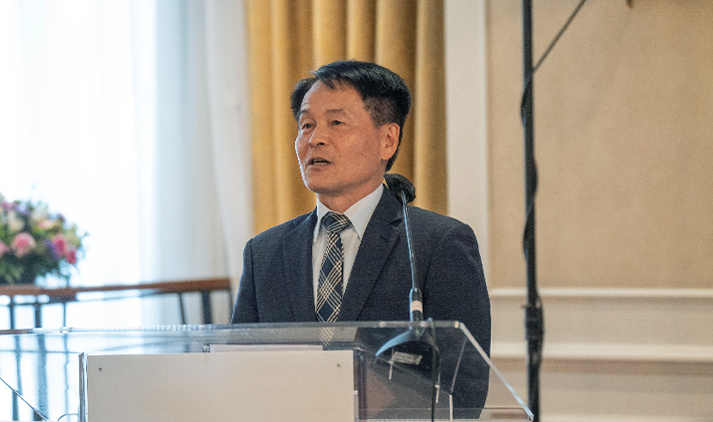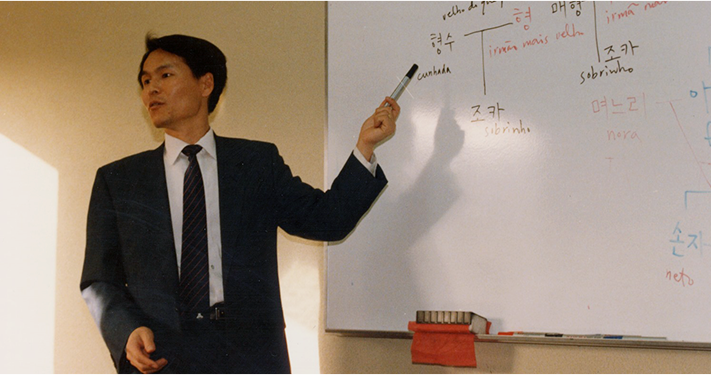

Recipient of the Presidential Citation
for Contributions to the Advancement
of Hangeul & A Pioneer
in Korean Language Education in Portugal,
Professor Kang Byung-goo of the KSI Lisbon
On October 9, during the 578th Hangeul Day celebration, Professor Kang Byung-goo of KSI Lisbon was recognized as
a recipient of the Presidential Citation for Contributions to the Advancement of Hangeul. This prestigious
award, presented by the Ministry of Culture, Sports and Tourism, honors individuals or organizations with
significant contributions to the promotion and development of Hangeul. Professor Kang Byung-goo has been at the
forefront of Korean language education in Portugal. He played a key role in establishing the first-ever Korean
Studies course at a local university and led the founding of KSI Lisbon. We spoke with him about his remarkable
journey and achievements.
Hello, Professor. Thank you for agreeing to this interview. Could you please introduce yourself to our
❬Monthly Knock-knock❭ readers?
Hello. I am Kang Byung-goo, an educator who has devoted over 30 years to promoting the Korean language in
Lisbon, Portugal. My connection with Portugal began in 1984. After graduating from the Department of Portuguese
at Hankuk University of Foreign Studies in Korea, I came to Portugal to study on a scholarship from the Calouste
Gulbenkian Foundation. From January 1986, I volunteered for three years as a teacher at a Hangeul School and
later served as the president of the Korean Association, holding the concurrent position of principal from 1999
to 2003. In 1988, I launched the first Korean Studies program (focusing on the Korean language and culture) at
NOVA University Lisbon’s Faculty of Social and Human Sciences (NOVA FCSH) and managed it for 25 years. Then, in
2013, I established KSI Lisbon at the same university and have since been working as a local educator and
operations team member.
What motivated you to settle in Portugal over 30 years ago and begin teaching the Korean language? At that
time, in the 1980s, Korean language and culture were largely unfamiliar in Portugal. Could you share how you
came to establish the first Korean Studies program at NOVA University Lisbon?
In the latter half of 1986, I enrolled in the graduate program in Western History (focusing on the Age of
Discovery and the history of Portuguese territorial expansion) at NOVA University Lisbon. One of my professors
there was also the head of the university’s Oriental Studies Institute. At the time, the Oriental Studies
Institute already offered courses in Chinese and Japanese Studies, which were available as elective subjects
within the university. However, there were no courses on Korean Studies. Coincidentally, this was a period of
growing interest in Korea, as the country was preparing to host the 1988 Seoul Olympics. The professor suggested
creating a Korean Studies program, focusing on the Korean language and culture, and asked if I would be willing
to lead it. With his encouragement and support, I launched the Korean Studies program in 1988, making it
available as an elective subject at the university. That’s how I began my journey in Korean language education.
 A photo of Professor Kang Byung-goo teaching a Korean language class in 1993
A photo of Professor Kang Byung-goo teaching a Korean language class in 1993
Professor Kang, you have dedicated over 30 years to Korean language education in Portugal, mentoring more than
a thousand students. As an educator, what is your philosophy or guiding principle when it comes to teaching
Korean?
The primary goal of Korean language education is, of course, to help students become proficient in Korean.
However, I believe it is equally important to spark their interest in Korea and deepen their understanding of
the country. To achieve this, I incorporate elements of Korean history, culture, traditions, customs, and
current affairs into my lessons whenever possible. Additionally, I organize various cultural events to give
students opportunities to directly experience our culture. I firmly believe in the value of hands-on learning.
In 2013, you spearheaded the establishment of KSI Lisbon at NOVA University Lisbon and began offering
systematic Korean Studies courses. Starting with 26 students, the institute now serves more than 10 times that
number. Over the past decade, as an educator and staff member of KSI Lisbon, have you encountered any notable
challenges or particularly memorable moments?
KSI Lisbon started in 2013 with 4 classes and 26 students. Today, it has expanded to 27 classes with 291
students learning Korean. The number of instructors has also grown from just one at the time of opening to a
team of six, including three local instructors and three dispatched educators. As the institute has grown, so
too have the variety and scale of its cultural events. One of the most memorable moments was the celebration of
the institute’s 10th anniversary, held from October 6 to 8, 2023. This event featured more than 20 programs and
drew over 1,000 participants.
Over the years, many students who learned Korean at KSI Lisbon have gone on to study in Korea as recipients of
government scholarships, university scholarships, or as self-funded students. Some of them have not returned to
Portugal but have found employment in Korea. Additionally, there have been cases where students, who started
learning Korean from the basics at the institute, achieved a Level 6 certification on the Test of Proficiency in
Korean (TOPIK) and secured jobs at Korean organizations in Lisbon. Witnessing these achievements makes me
realize the positive impact that the institute’s education and activities have on the students, and these
moments bring me immense satisfaction.
(Left Photo) A commemorative photo taken with students who participated in the 2014 "Quiz on Korea"
competition
(Right Photo) Professor Kang Byung-goo (first from the right) meeting with students studying in Korea during
their time in Seoul in 2017
Your dedication to Korean language education in Portugal has culminated in your selection as a recipient of
the Presidential Citation for Contributions to the Advancement of Hangeul, awarded by the Ministry of Culture,
Sports and Tourism. Congratulations! What does this honor mean to you, and could you share your thoughts and
feelings about receiving this recognition?
First and foremost, I feel deeply honored to receive this award and am incredibly grateful for the recognition
of my efforts. In the early stages, the Korean Studies program at NOVA University Lisbon received support from
the National Research Foundation of Korea and the Korea Foundation for International Exchange. However, after
that initial phase, I managed the program without any financial assistance, driven solely by a sense of
responsibility and mission to sustain Korean Studies. This award holds special meaning for me as it represents
the fruits of my perseverance through many challenges. I will continue to do my utmost to further develop Korean
language education and Korean Studies in Portugal.
Professor Kang Byung-goo at the 578th Hangeul Day celebration on October 9, where he received the Presidential
Citation for Contributions to the Advancement of Hangeul (Photo courtesy of Korea TV YouTube)
What is your perspective on the future of Korean language education in Portugal, not just at KSI Lisbon but
across the country?
Recently, the enthusiasm for K-pop has been soaring in Portugal. As the influence of Hallyu (the Korean Wave)
grows, the demand for Korean language courses is also expected to steadily increase. However, outside Lisbon, a
city of 550,000 people, the demand in other cities is not yet sufficient to justify opening new KSIs or offering
Korean language courses at local universities. To improve accessibility across Portugal, I believe online
courses offered by KSI are essential. Since the COVID-19 pandemic, some online courses have been introduced, and
I think these should be maintained to meet the needs of learners throughout Portugal, particularly in island
regions and Portuguese-speaking African countries.
Finally, after more than 30 years of solidifying the foundation for Korean Studies in Portugal, could you
share your remaining goals or plans?
In Portugal, a bachelor’s degree program specifically in Korean Studies has yet to be established. In 2004, the
University of Minho opened a Department of Oriental Studies, and in 2015, the University of Lisbon’s Faculty of
Letters introduced an Asian Studies program. However, due to the lack of students and professors focusing on
Korean Studies, there are very few courses related to the field. In response to requests from some KSI Lisbon
students interested in Korean Studies, we introduced a Korean History course in the second half of 2022. NOVA
University Lisbon’s Faculty of Social and Human Sciences (NOVA FCSH) is the managing institution of KSI Lisbon,
which has been offering Korean Studies as an elective subject since 1988. It would be ideal if this university
were to establish a bachelor’s degree program in Korean Studies. Until that day comes, I plan to continue
preparing my lessons diligently, just as I always have, and to do my utmost to provide the best possible Korean
language education to Portuguese students.